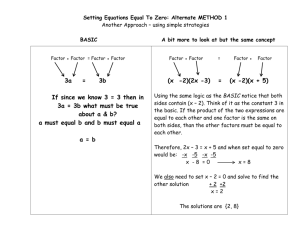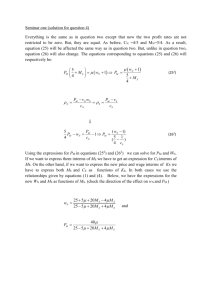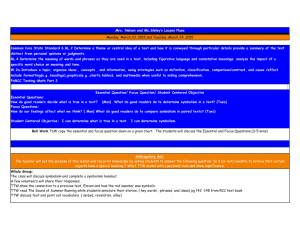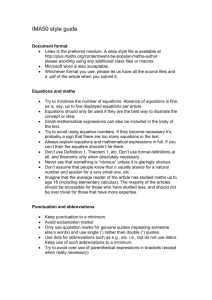Math lesson plans Dec2
advertisement
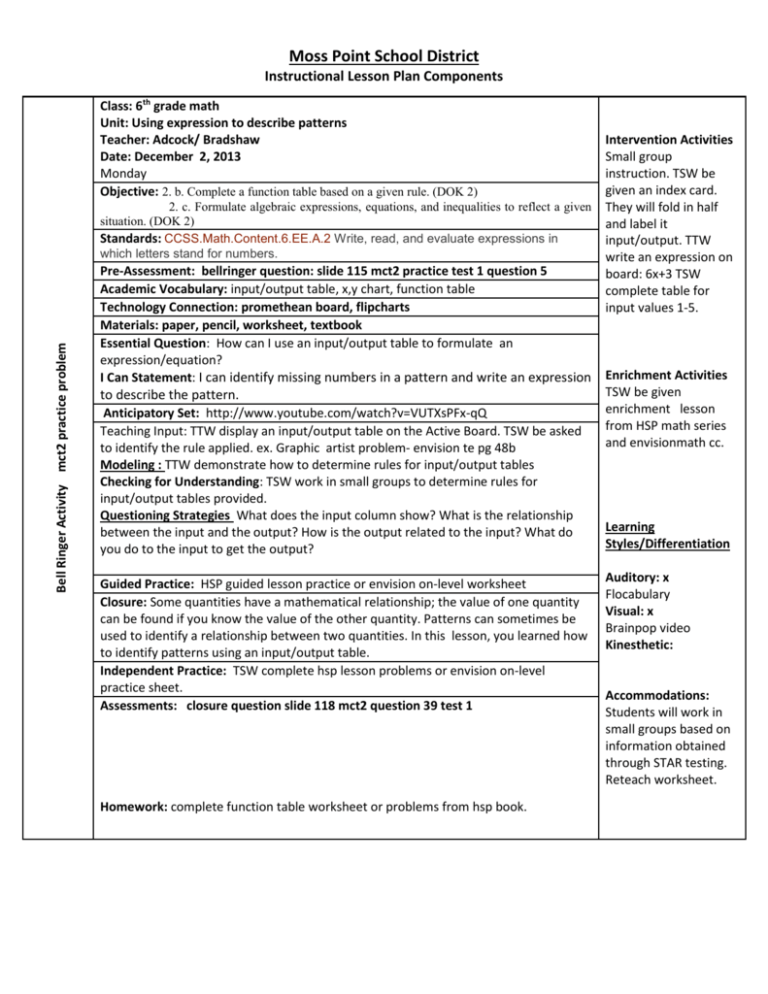
Moss Point School District Instructional Lesson Plan Components Class: 6th grade math Unit: Using expression to describe patterns Teacher: Adcock/ Bradshaw Date: December 2, 2013 Monday Objective: 2. b. Complete a function table based on a given rule. (DOK 2) Bell Ringer Activity mct2 practice problem 2. c. Formulate algebraic expressions, equations, and inequalities to reflect a given situation. (DOK 2) Standards: CCSS.Math.Content.6.EE.A.2 Write, read, and evaluate expressions in which letters stand for numbers. Pre-Assessment: bellringer question: slide 115 mct2 practice test 1 question 5 Academic Vocabulary: input/output table, x,y chart, function table Technology Connection: promethean board, flipcharts Materials: paper, pencil, worksheet, textbook Essential Question: How can I use an input/output table to formulate an expression/equation? I Can Statement: I can identify missing numbers in a pattern and write an expression to describe the pattern. Anticipatory Set: http://www.youtube.com/watch?v=VUTXsPFx-qQ Teaching Input: TTW display an input/output table on the Active Board. TSW be asked to identify the rule applied. ex. Graphic artist problem- envision te pg 48b Modeling : TTW demonstrate how to determine rules for input/output tables Checking for Understanding: TSW work in small groups to determine rules for input/output tables provided. Questioning Strategies What does the input column show? What is the relationship between the input and the output? How is the output related to the input? What do you do to the input to get the output? Guided Practice: HSP guided lesson practice or envision on-level worksheet Closure: Some quantities have a mathematical relationship; the value of one quantity can be found if you know the value of the other quantity. Patterns can sometimes be used to identify a relationship between two quantities. In this lesson, you learned how to identify patterns using an input/output table. Independent Practice: TSW complete hsp lesson problems or envision on-level practice sheet. Assessments: closure question slide 118 mct2 question 39 test 1 Homework: complete function table worksheet or problems from hsp book. Intervention Activities Small group instruction. TSW be given an index card. They will fold in half and label it input/output. TTW write an expression on board: 6x+3 TSW complete table for input values 1-5. Enrichment Activities TSW be given enrichment lesson from HSP math series and envisionmath cc. Learning Styles/Differentiation Auditory: x Flocabulary Visual: x Brainpop video Kinesthetic: Accommodations: Students will work in small groups based on information obtained through STAR testing. Reteach worksheet. Moss Point School District Instructional Lesson Plan Components Class: 6th grade math Unit: Problem Solving: Make a Table Teacher: Adcock/Bradshaw Date: December 3, 2013 Tuesday Objective: 2. b. Complete a function table based on a given rule. (DOK 2) 2. c. Formulate algebraic expressions, equations, and inequalities to reflect a given situation. (DOK 2) Bell Ringer Activity Standards: 6.EE.6- Use variables to represent numbers and write expressions when solving a real-world or mathematical problem; understand that a variable can represent an unknown number, or, depending on the purpose at hand, any number in a specified set. Intervention Activities “Do now” problems at beginning of class. Review of previously taught objectives. (Tissue box example)envision te pg 53b Pre-Assessment: Bellringer mct2 practice test question slide 120 test1 question 45 Academic Vocabulary: function table, x/y values Technology Connection: promethean board, flipcharts, WWW Materials: pencil, paper, worksheets Essential Question: Can problems be solved by recording and organizing data in a table? I Can Statement. I can solve problems by recording and organizing data in a table and by finding and using numerical patterns in the table. Anticipatory Set: Charlie and his bank account example. (envision te50b) Teaching Input: Pose problem- Charlie has 25 dollars in the bank. He adds 5 dolars to the account each week. Write an expression that represents how much he has after x weeks. Then show amount after 3 and 5 weeks Modeling: .make a table Checking for Understanding: TSW work with partner to discuss questions asked by teacher. -Think Pair Share Questioning Strategies What are you asked to do first? What expression can you use? How did you decide? Enrichment Activities TSW be given enrichment lesson from HSP math series and envisionmath cc. Guided Practice: TSW complete example Douglas Family te pg 50 Closure: Independent Practice: envision worksheet or hsp lesson Assessment: closure question mct2 test2 question 41 slide 126 or slide 140 Students will work in small groups based on information obtained through STAR testing. Homework: Complete Independent practice Learning Styles/Differentiation Auditory: X Flocabulary songs Visual: X Flocabulary video, brain pop videos Kinesthetic: X Accommodations: Moss Point School District Instructional Lesson Plan Components Class: 6th grade math Unit: Teacher: Adcock, Bradshaw Date: December 4, 2013 Wednesday Objective: Intervention Activities Do now problems assessment Standards: Pre-Assessment: Academic Vocabulary: Technology Connection: promethean board, flipcharts Materials: textbook, paper, pencil, worksheets, Essential Question: I Can Statement: Anticipatory Set: Modeling . Checking for Understanding: . -Think Pair Share Questioning Strategies Guided Practice: Closure: Independent Practice: Assessments: Integers: adding, subtract, multiply, divide Expressions: writing and evaluating Properties Homework: Enrichment Activities Learning Styles/ Differentiation Auditory: X Visual: X Kinesthetic: X Accommodations: Class: Math Unit: Solving addition and subtraction equations Teacher: Adcock/Bradshaw Moss Point School District Date: December 5, 2013 Instructional Lesson Plan Components Thursday MS Objective: 2. Use algebraic functions, patterns, and language across a variety of contexts. a. Solve simple equations using guess-and-check, diagrams, properties, or inspection, explaining the process used. (DOK 2) c. Formulate algebraic expressions, equations, and inequalities to reflect a given situation. (DOK 2) Bell Ringer Activity Standard: Identify when two expressions are equivalent (i.e., when the two expressions name the same number regardless of which value is substituted into them). For example, the expressions y + y + y and 3y are equivalent because they name the same number regardless of which number y stands for. Solve real-world and mathematical problems by writing and solving equations of the form x + p = q and px = q for cases in which p, q and x are all nonnegative rational numbers. Pre-Assessment : bellringer Academic Vocabulary: : equation, addition property of equality, subtraction property of equality, inverse relationship Technology Connection: promethean board, hsp flip chart Materials: textbook, worksheet, paper, pencil, Essential Questions: How can you get the variable alone in an addition or subtraction equation? I can: I can solve an equation involving finding the value of an unknown that makes the equation true. I can solve an equation in more than one way. Anticipatory Set: Ask students: what are some things you can think of that can be undone by their opposites? What is the opposite of addition? Teaching Input: Ex. Some students were in the classroom. 16 more came into the room. Now there are 25 students in the classroom. How many students were in the room in the beginning? Modeling: TTW write x+16 =25 model solving the problem Intervention Activities TTW write equations on chalk board. TSW identify the inverse relationship that will put x alone on one side of equation. (envision te 101b) Small group instruction. Do now problems Peer tutoring Enrichment Activities TSW be given enrichment lesson from HSP math series and envisionmath cc Learning Styles/Differentiation Auditory: Flocabulary videos Visual: Flocabulary videos and Brainpop Kinesthetic: Checking for Understanding: observation, see which pairs of students solved problem correctly. Questioning Strategy: How can you get the variable alone in an equation? What is the first step to getting a variable alone? (identify the operation, and then apply the inverse operation). Guided Practice: Ex about George(envision te pg 98) Closure: Solving an equation involves finding the value of the unknown that makes the equation true. There is more than one way to solve an equation. In this lesson you learned how to use inverse operations to get variables alone and to solve simple subtraction and addition equations. Accommodations: Students will work in small groups based on information obtained through STAR testing Students will model integers on number line on floor. Moss Point School District Instructional Lesson Plan Components Independent Practice: envision on-level, or hsp practice pg, or pizzazz math sheet Assessments: closure question Bell Ringer Activity mct2 practice problem Homework: hsp problems from book Class: 6th grade math Unit: Solving multiplication and division equations Teacher: Adcock/ Bradshaw Date: December 6, 2013 Friday Objective 2. Use algebraic functions, patterns, and language across a variety of contexts. a. Solve simple equations using guess-and-check, diagrams, properties, or inspection, explaining the process used. (DOK 2) c. Formulate algebraic expressions, equations, and inequalities to reflect a given situation. (DOK 2) Standards: : Identify when two expressions are equivalent (i.e., when the two expressions name the same number regardless of which value is substituted into them). For example, the expressions y + y + y and 3y are equivalent because they name the same number regardless of which number y stands for. Solve real-world and mathematical problems by writing and solving equations of the form x + p = q and px = q for cases in which p, q and x are all nonnegative rational numbers. Pre-Assessment: Bellringer Academic Vocabulary: equation, addition property of equality, subtraction property of equality, inverse relationship, multiplication property of equality, division property of equality Technology Connection: flipcharts, promethean board Materials: textbook, paper, pencil Intervention Activities TTW write problems on board. TSW identify the inverse relationship that put x alone on one side of the equations.(te pg109b) Small group instruction. Enrichment Activities TSW be given enrichment lesson from HSP math series and envisionmath cc. Center activity(envision) Moss Point School District Instructional Lesson Plan Components Essential Question: How can you get the variable alone in a multiplication or division equation? I Can Statement:: I can solve an equation involving finding the value of an unknown that makes the equation true. I can solve an equation in more than one way. Anticipatory Set: David and May pencil ex. (te pg 106b) Teaching Input: TTW demonstrate how to solve each problem. Checking for Understanding : observation Questioning Strategy What does variable stand for? What is the inverse operation? Guided Practice: hsp book problems Closure: In this lesson you learned about the inverse relationship between multiplication and division, and how to use this relationship to solve multiplication and division equations. Independent Practice: hsp book problems, or envision leveled practice page, or pizzazz math sheet Learning Styles/Differentiation Auditory: x Flocabulary Visual: x Brainpop video Kinesthetic: Accommodations: Students will work in small groups based on information obtained through STAR testing




